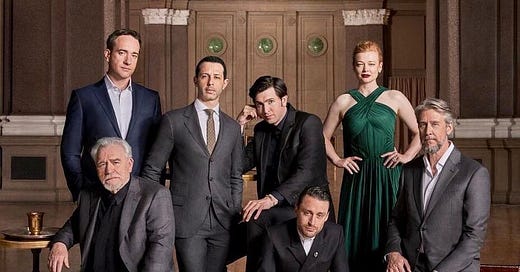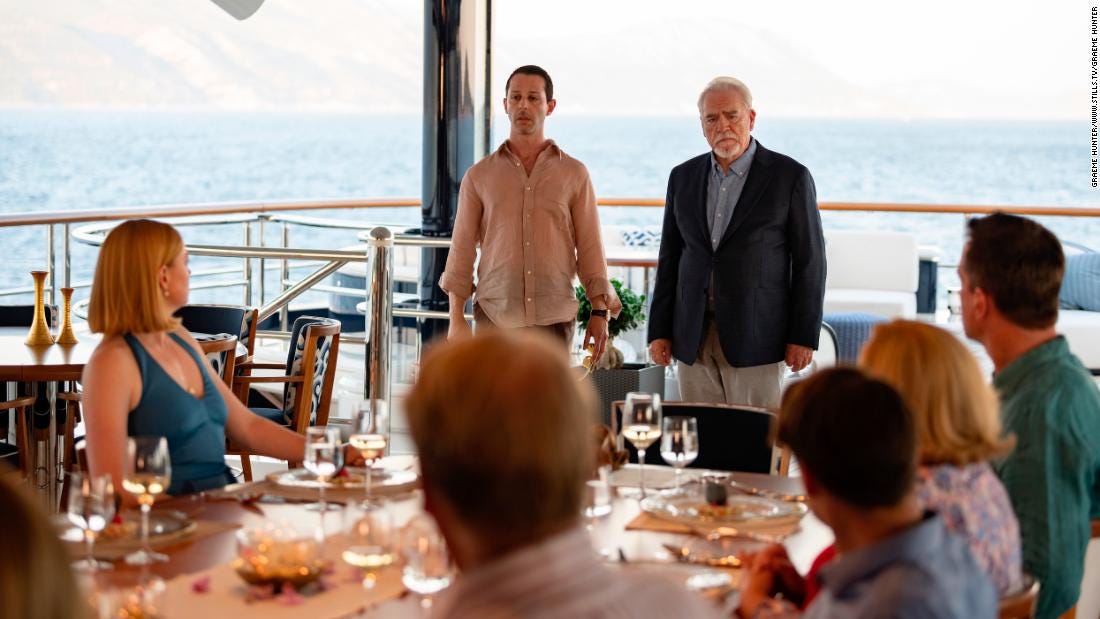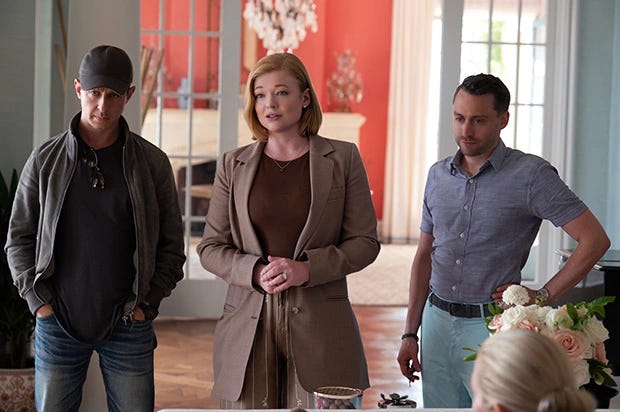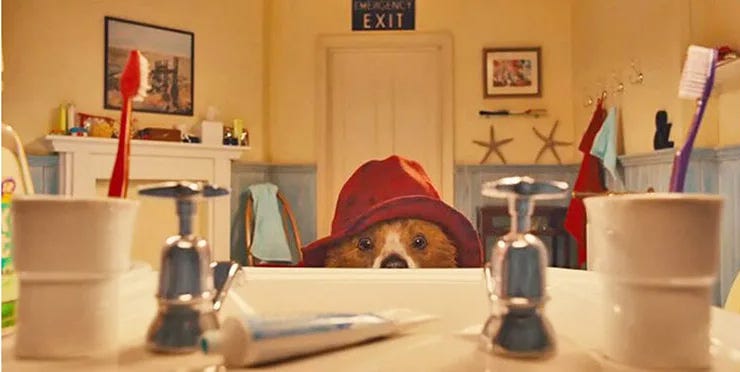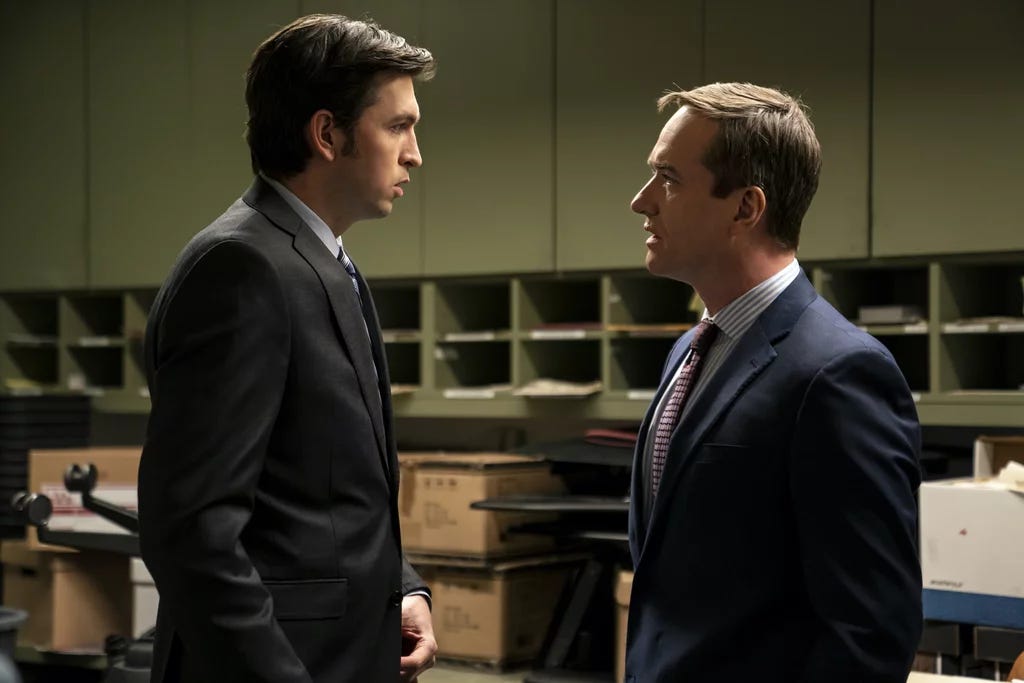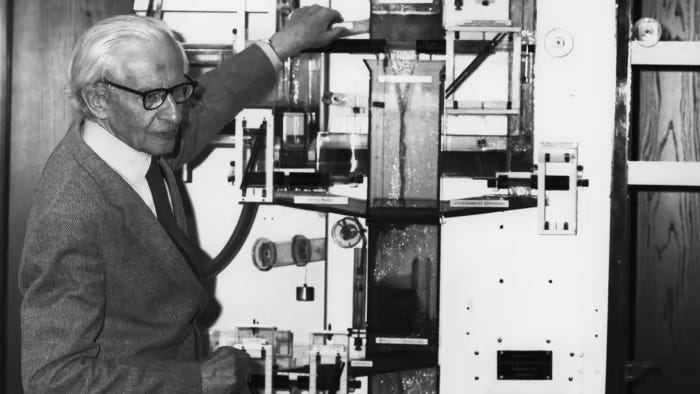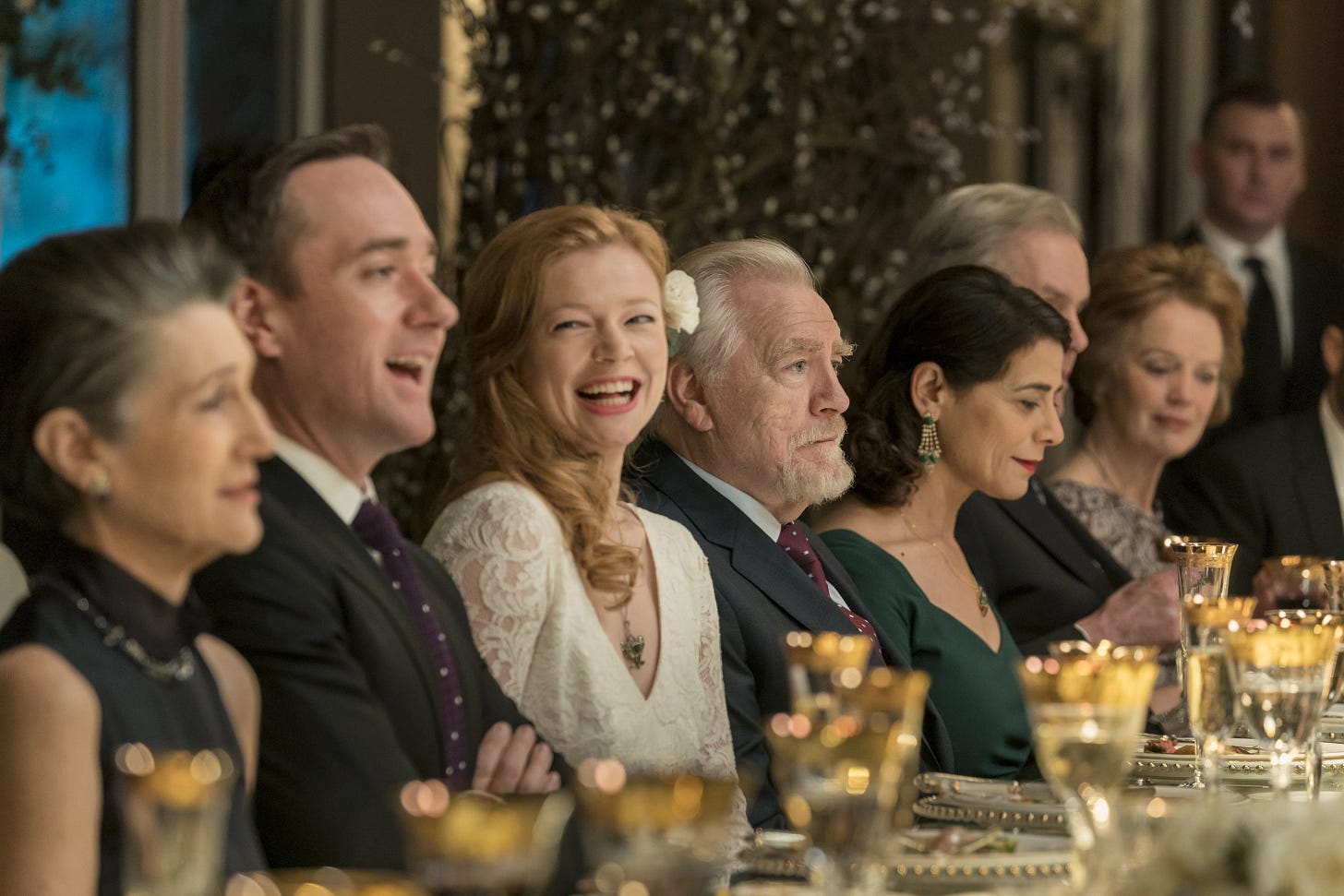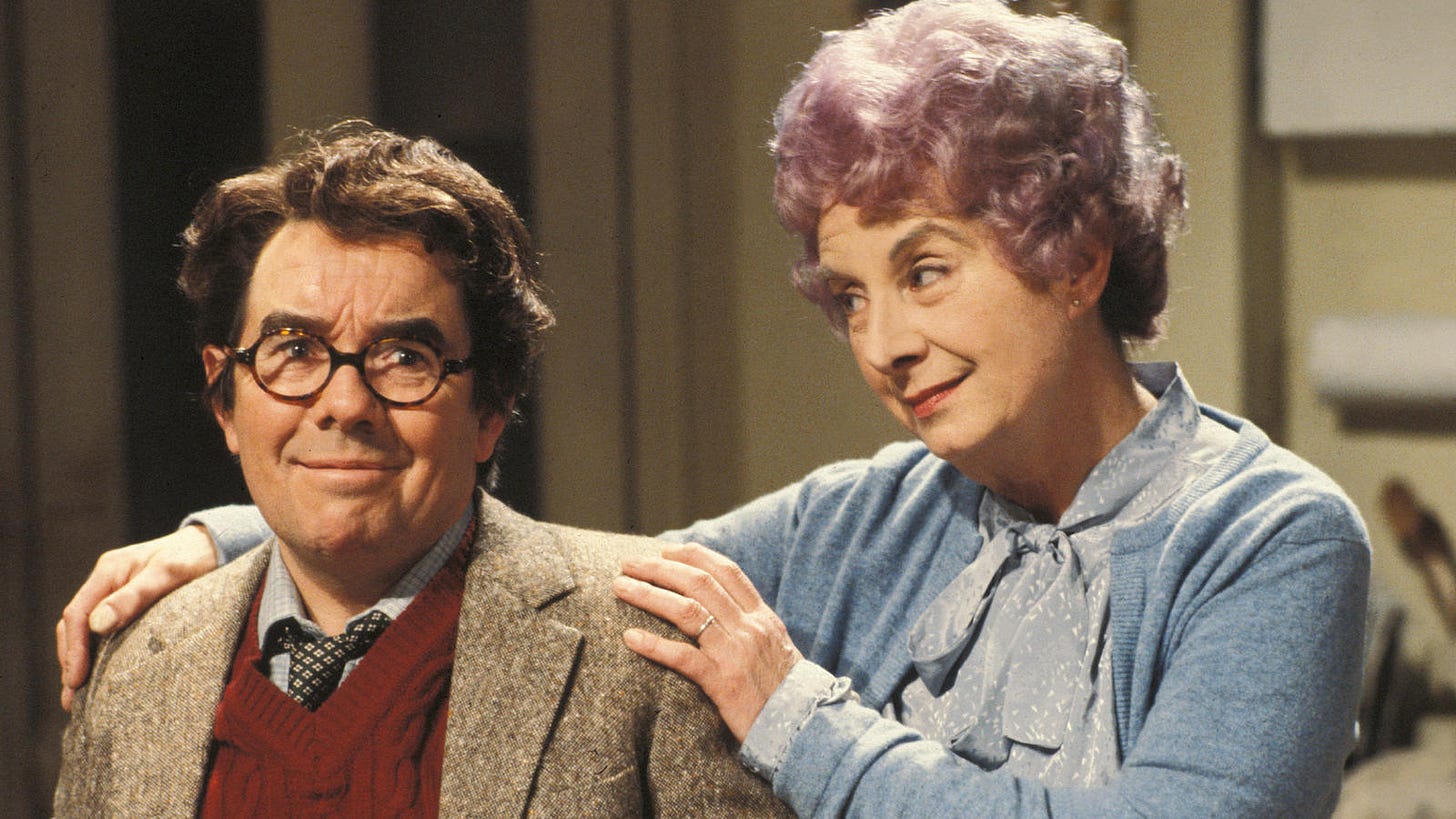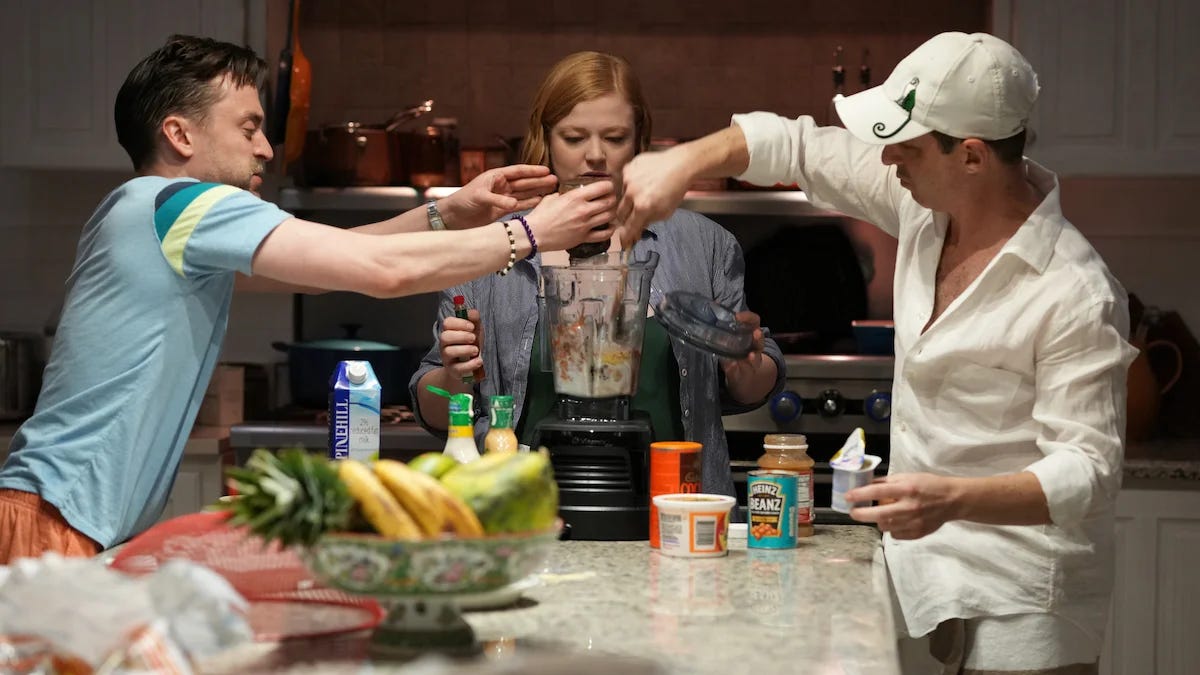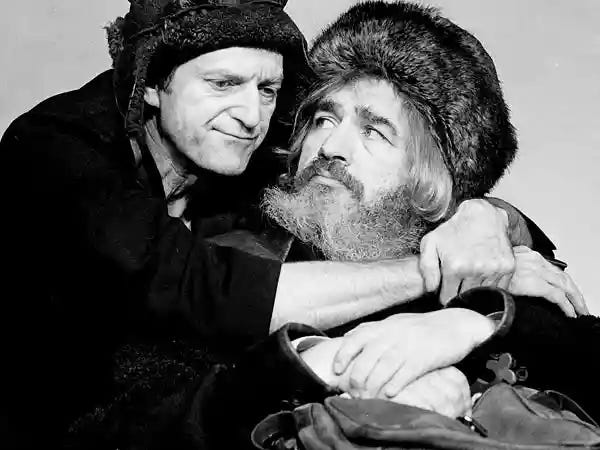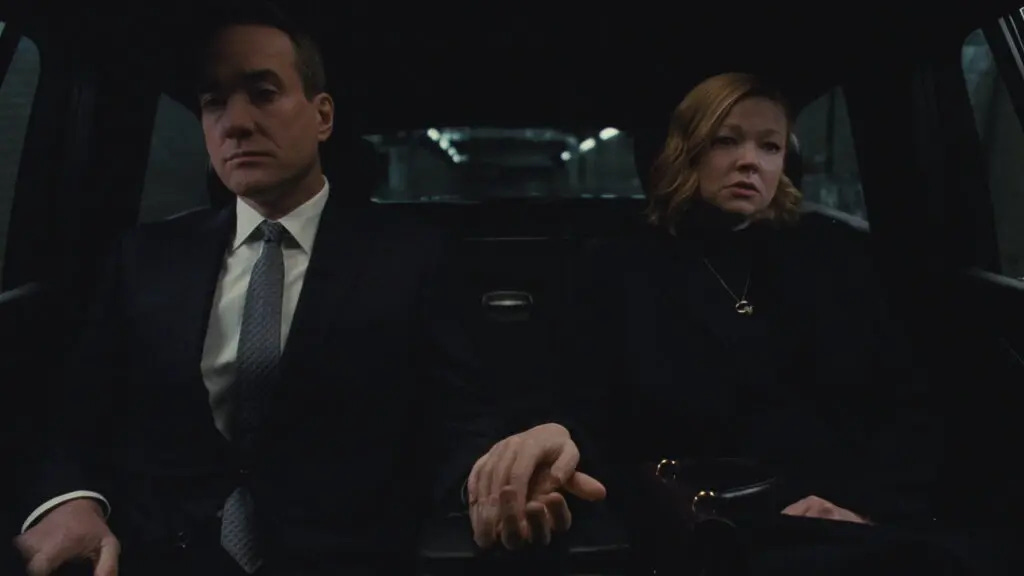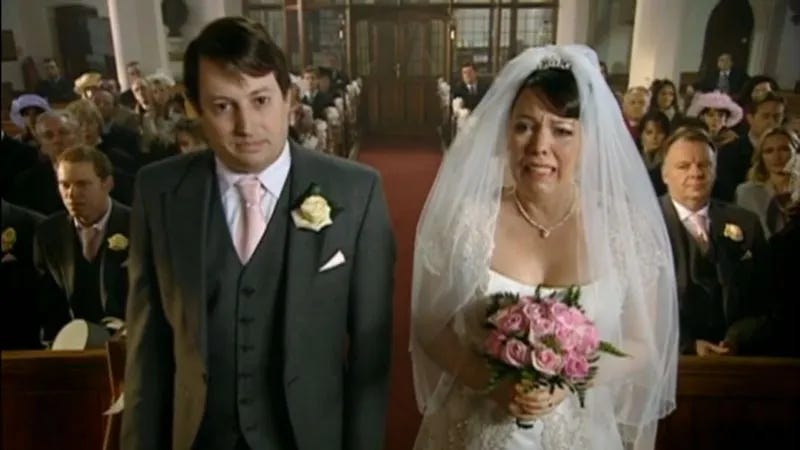Succession is filmed before a live studio audience...
Why the best television drama ever ever ever (etc) is a sitcom.
CONTAINS SPOILERS FOR SUCCESSION, INEVITABLY
Given the column miles already offered on the subject, I wondered about offering a hot take on ‘Succession’. But then I thought that I like Boxing Day lunch way more than Christmas dinner, so why not wait for it to cool and turn my hot take into lovely cold-take bubble and squeak? Much nicer.
I loved Succession from the very start. I loved the class and the craft, the luxurious trust in the audience’s good taste. I adored its clarity and its viciousness. And I liked it because it’s not a drama at all. It’s a sitcom.
Why is it a sitcom? Because it moves like a rocket, and yet it never moves. It occupies that beautiful sweet spot where all good sitcoms hang, oscillating in a magnetic comic field, held by the opposing forces of antic pace and total stasis. It’s a masterpiece of the form.
I confess that the current Golden Age Of Television sometimes leaves me a bit lost. For various reasons, I struggle slightly with long form drama. I have written about it before, and bored my friends with my moans. I’m fun. The length and languor of modern TV drama frustrates me. I want pace. Feed me. Fast. I pick up a guitar. I pause six minutes in and go and get cups of tea. I look at my phone a lot. None of which seems to afford the work the respect it deserves. Succession writer Lucy Prebble once declared, “If you watch a whole episode of something, without looking at your phone, that now counts as a book.” I suspect that my liking for Succession was because it was written by those sorts of people. Comedy sort of people.
The credit list for Succession looks like aliens from Planet Important Box Set TV landed and kidnapped our finest comic minds to make their barren planet giggle. It’s ridiculous. Like the other Greatest Television Show Ever that reached its climax recently, Better Call Saul, Succession is drama software running on comedy hardware.
As a culture, we seem to have decided that creators should graduate from comedy to drama, to reap proper budgets and acclaim. Makers should ‘grow out’ of comedy and claim the rewards available for keeping a straight face. To me, that’s like insisting that eventually sculptors should get so good they can ditch the hammer and start playing the cello. The crafts of drama and comedy are similar, but separate, and to put them in a hierarchy ignores how much we love both. I’m trying to think of the last time someone really insisted I watch a sitcom (Ted Lasso, possibly?) compared to the dozens of recommendations a day I get for great long-running drama. Humans need to laugh, and if we replace our must-see comedy with must-see drama, we’ll just want that drama to be really funny. And that’s what’s happened with Succession, I think, in that it’s a pedigree drama series built to fulfil the chin-stroking ‘have you seen?’ dinner-party-and-social-media set’s need for a belting sitcom.
Succession has a cast of characters (a family, like you get in a sitcom) and they act in character, and you guess what they’ll say and do next, and even if you were wrong, and they surprise you, a quick double check reveals that their nonsense is always in character, and you don’t need to change your template after all, and that’s the fun. And... well, that’s it.
There’s no murder, no mystery, no ticking bomb. Just a beautiful doll’s house of people to watch, and play ‘theory of mind’ with. Comedy allows us to practice useful social guessing games. And when we’re right, or wrong, but when the characters are ‘typical’ – typical Greg, typical Roman, typical Chandler, typical Del Boy, typical Edina, typical Conor, typical Shiv – we are happy. It's an important skill for humans to learn – what will those nutcases over there do next? – and we love playing at it.
I’ve heard some fairly dumb criticism that Succession’s dialogue wasn’t authentic, as if that was ever the aim. No. It’s a big, lavish sitcom. The dialogue was heightened for comic effect. D’oh. Comedy isn’t slavish representation, a high definition photograph. It’s thematic, abstract, playful, allegorical, exaggerated, distorted, impressionistic, an analogue for human life, not a photocopy. Comedy is rich because its colours are sometimes wild. Comedy is Van Gogh, not verité.
I was lucky enough to be invited to a screening of the penultimate episode, The One With The Funeral. The sound of laughter in the room was amazing. This rolling, continuous, loud, generous, uplifting bubble of joy. Afterwards, Jesse Armstrong said that he was slightly concerned that people were laughing over some of the more serious funeral orations. But that was just a sign that everyone in the room was in the mood for comedy, suffering leftover giggles. I don’t imagine screenings of Chernobyl or Happy Valley or Cracker were like that (even though there were good jokes, and fine comic talent, in all of those). Drama-with-good-jokes-in-it is different from a comedy, and Succession is very much a comedy.
Where drama is a marathon, paced for stamina, comedy is a load of panting shuttle runs to get laughs. The drum ticks quickly behind comedy, with regular b-dum tish moments, creating a manic little dance of riffs and jigs. Drama is a pulsing, mounting Shepherd tone, that leaves us on edge, and which we’ll wait to pay off.
Critics who complained that the action in Succession was slow, or arcane, that nothing seemed to resolve, were watching the wrong show. Nothing resolves in The Good Life. Nobody finds out the identity of the travelling brush salesman that Tom and Barbara have buried in their garden and covered up with an improbable story about self-sufficiency. That’s drama. In comedy, we watch the characters within a comprehensible but fairly static situation, the better to help us read their actions and intentions clearly, and with depth. Comedy is a human guessing game, about character within a restricted space, not an exercise in teased plot.
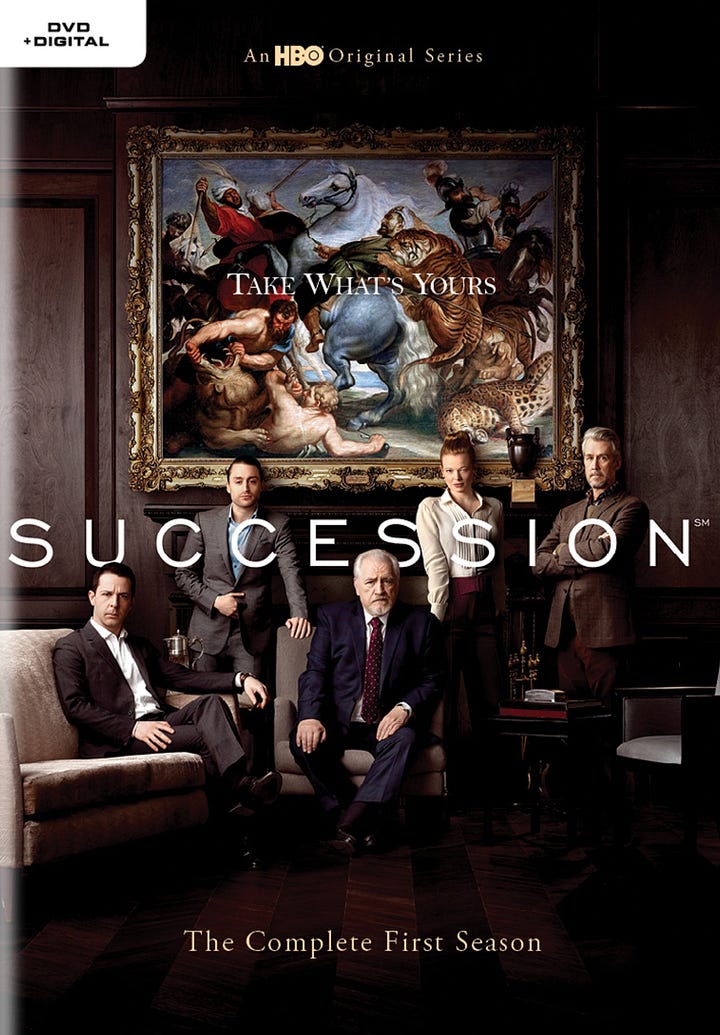
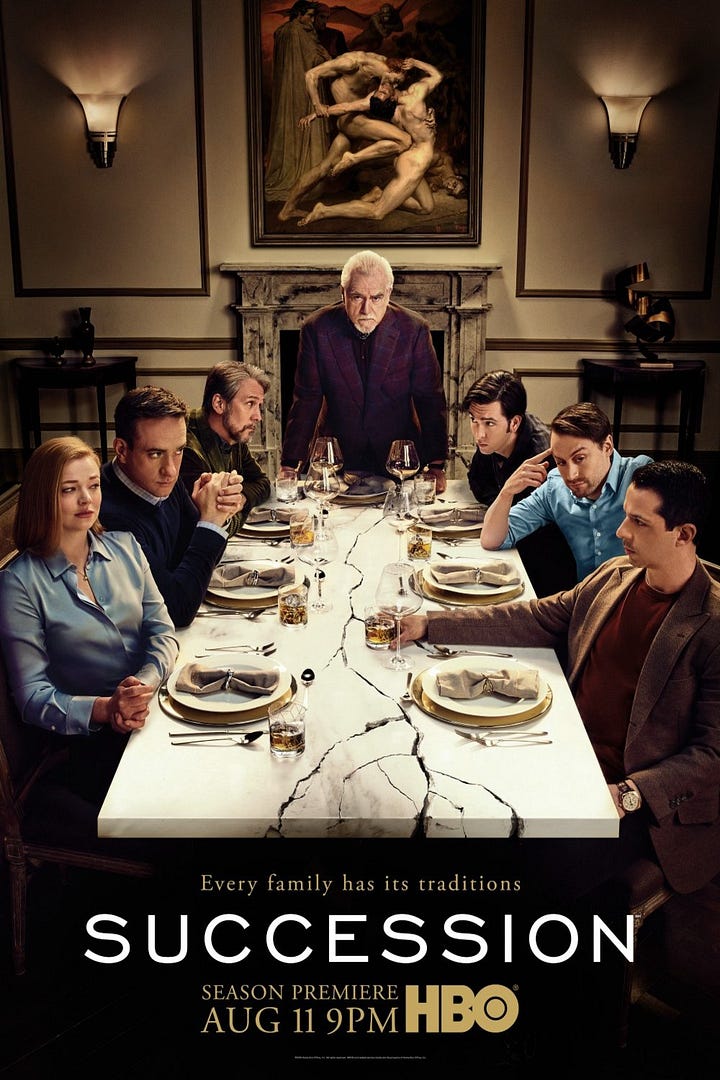
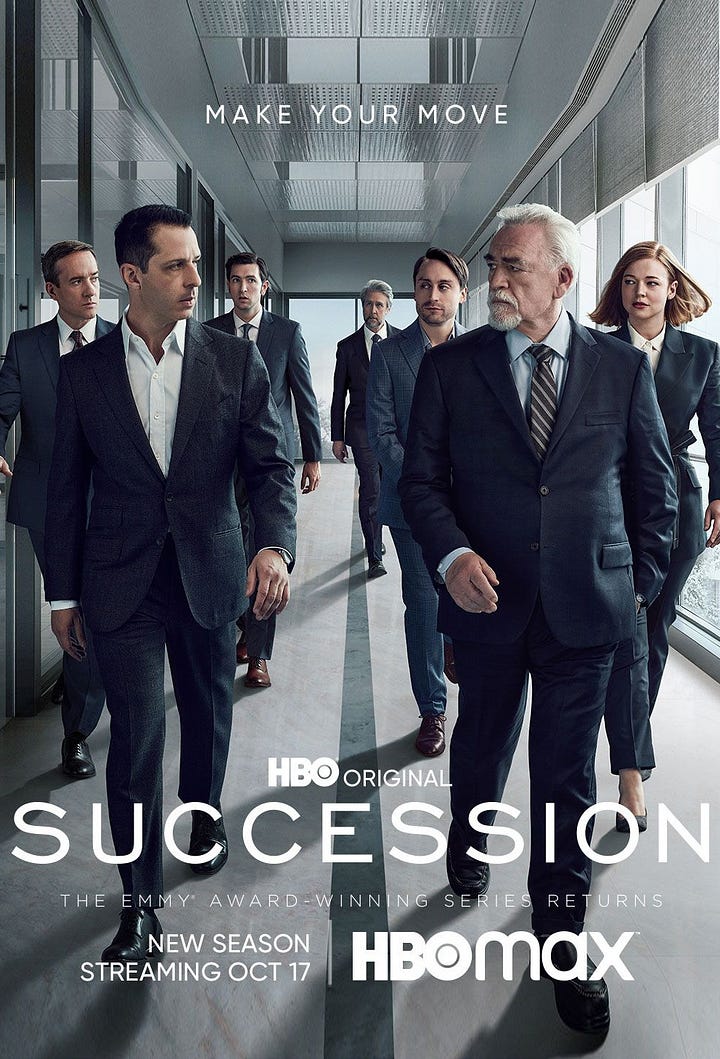
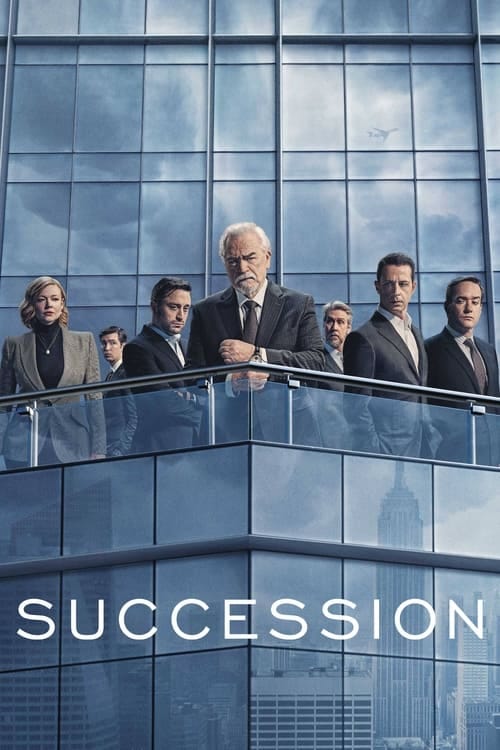
Succession classily kept a single question burning on the drama timeline throughout – who will succeed? – and then played all the rest of its games at rat-a-tat comedy pace. Look at the poster art for each season. What’s changed? Almost nothing each time. A sitcom reset. Totally interchangeable. It’s almost as if… nothing has happened. And that’s exactly right.
Watch this wonderful sketch about season one, where the single question is who will get Logan Roy’s M&Ms? You could watch it for season four, and still get all the jokes. The characters, their drives, wants and needs, are firmly controlled. That’s because the show is a masterclass in disciplined, informed, sitcom-strong character writing. The family seem to be in constant motion – it’s a premium box set drama, we expect that – but the genius is that they never move an inch.
There is a theory that comedy is about trapping characters, either physically, (Porridge, Red Dwarf), or through their own flaws, (Frasier, Fawlty Towers). It’s why families and workplaces produce such great sitcom settings. It’s why Ghosts is so formally perfect. Sitcom is about stasis. Characters hope to move, to escape the trap, and then they don’t. The ultimate expression of the sitcom impulse might be Beckett’s Waiting For Godot.
‘Let’s go.’
They don’t.
By trapping our characters, when we start the next episode, the audience will still know all the characters, and they won’t have changed. The shy one isn’t brave now. The dumb one isn’t clever. The angry one hasn’t learned to calm down. Viewers bring their templates of predicted behaviour, to play the guessing game, and they fit every time.
I often think that good comedy plotting is about turning on taps and turning them off.
At the start of the average half hour sitcom, say, you turn on a load of taps. The characters say ‘Ooh, watch out. That tap’s running’ and promise to deal with it. Or maybe the audience spot a running tap that the characters haven’t spotted. Doesn’t matter. Just make sure some taps are on. There’s going to be a flood. That flood might change the characters we know and love. That’s what is at risk. But the idea is that by the end of the episode all the taps are off again. There was a problem, it was solved. There was a question, it was answered. There was a need, it was fulfilled.
And we’re happy because everyone’s back where they were, so we can enjoy them again next time. The pieces on the board must not change, or we won’t know how to play the game if we stumble upon a random episode when we flop on the sofa. Which is how sitcom came to dominate schedules and prop up whole channels. It’s endlessly repeatable, watchable in single doses, you always know where you are. Every character must stay roughly how they are in the titles. Goofy, angry, dumb, sexy, tall, whatever. That’s the contract. Drama is all about change, which is why you binge it, to see what happens next. Comedy is about stasis, and so you can drop in and out any time.
The clever thing for a good sitcom is that you can get audiences to tune in next week by leaving one tap running. This gives you a long arc. That’s kind of like drama, right? You want to know how it turns out, and you don’t totally relax. What about that tap at the back? Guys! Mystery and romance are great taps to leave on. It’s how everything from The Good Place to Back To Life to The Beiderbecke Affair to Search Party works. It’s the will-they-won’t they storylines in Friends, Moonlighting, Frasier, Cheers.
What sophisticated comedy does is use both paces at once. Quick comic games of expectation and delivery, and one long tease in the background. Will the Detectorists find the treasure? Will Vince and Penny get together? Hell, will the plane land in Airplane!? You do care, even if you think you don’t. Just one tap running, in the background, keeps you watching, gives a comic story some shape and propulsion, but doesn’t break the comedy contract of flipping the taps on and off quickly for laughs. Set up, development, punchline. You know the rules. Nobody leaves a punchline til next week. That’s crazy. But you can promise to give an answer to one thing… in a bit… hang on…
The art of leaving loads and loads of narrative taps running for ages, however, is the high achievement of the modern streaming box set drama. What’s remarkable about Succession is how it achieved that same feeling of dynastic, novelistic storytelling, but kept turning the taps off like a sitcom, trapping its characters back roughly where they started again and again, refusing to let any of them move or change. Taps were often only turned off in Game of Thrones when someone got an axe in their head, otherwise, it was all dripping at once, and we watched all the complex interactions of the overflowing bathtubs like that MONIAC machine they built to demonstrate the economy with buckets of water.
Succession’s genius was to leave only one tap dripping most of the time, like a great sitcom. Watch the arcs. They are constantly thwarted and reset, often over a single episode, sometimes, stylishly, over two. Someone is offered the inheritance, then it is taken back within the same episode, or the next one. In the last season, Succession’s very own Ross and Rachel, Tom and Shiv, are at each other’s throats, then back together, so hot they are almost literally eating one another, and then back to a bickering George-and-Mildred set up within, what, an hour?
You won’t drop in on a random episode of Succession on the telly in a few years and not understand the relationship of your favourite dysfunctional couple instantly, because it was always fixed, while appearing to be in feverish motion. The actual theme of the show is that people can’t move, can’t grow, can’t change, because one monstrous man won’t let them. That means it’s easier to work out where you are in a random episode of Succession than it is in Friends. Less happens, there’s less change. They didn’t even get rid of a monkey.
One of Succession’s best jokes is that the background keeps changing, expensively, but they can’t actually go anywhere. I was laughing recently with a very experienced BBC producer that there is a BBC2 version of this show (made domestically with all this domestic talent) where it’s mainly interiors of bland W1A board rooms standing in for the Murdoch empire, plus the occasional green screen insert of a helicopter, cruise ship or a ski lift. A sort of supercharged Howards’ Way, like a Fry and Laurie sketch, dammit.
But the budget-busting luxury is part of the story, precisely because we boggle at it while none of the characters can see it. They are always moving, always escaping, free to go anywhere, but stuck with one another, trapped in time, arrested at childhood, unable to look up or out. All that cushioning luxury bores them. The lavish staging stops it looking like a sitcom, but it merely underlines that the Roy kids can’t get out any more than Edmund Blackadder can leave his three poky studio sets.
The title sequence is the giveaway. Only a maniac would ever Skip Intro, right? It’s not just down to Nicholas Brittell’s sensational tune. It’s because it told you the set-up for the story as surely as the old rat-a-tat A-Team voiceover. The younger Roys are insects caught in that Sony Handicam amber smear. They are children. They are ‘not serious people’. He hasn’t let them grow.
You don’t need a Previously On Succession. It’s that title sequence. Trapped in luxury, trapped in childhood, trapped by their father, their parents, their protective-but-stiff family. Sure, its sitcom bones mean that Succession sometimes feels like an epic take on Arrested Development, but it’s also not a million miles away from Sorry! And that’s great. Because that’s a fantastic comic set-up.
And sure enough, the show builds to the Roy kids making mud pies, swapping in-jokes, in their mum’s kitchen. We see them re-enacting games they once played in a shared space, like we might remember doing with our own siblings. Private games invoked as a magical defence from trauma, under a giggly blanket and cushion tent, bolstered against the raging storm outside.
And that raging parental storm is a hint that the biggest trap of all is a sophisticated literary joke. The Roy children are, like Rosencrantz and Guildenstern, trapped in supporting roles within someone else’s story. And this time it’s not Hamlet. It’s Act One Scene One of King Lear.
An infirm king is about to share out his kingdom, and he wants his kids to fight for it. The writing team deliberately set their show within a single moment of Shakespeare, like a grisly Murdoch clan Groundhog Day. They may even have worried, like all sitcom writers, that it might not be possible to keep their characters frozen in the trap. But this was the secret to it working as a sitcom. That this was a bunch of characters looping eternally at the start of King Lear, never allowed to move on. The name’s there in plain sight. Lear, Roi... Leargan Roy... Logan Roy.
It’s why the incident that changed everything, that was promised from the first episode, eventually happened out of sight. The unthinkable change was not witnessed from within the trap. We needed to stay away, with Roman, doubting, still not really knowing ‘is he in there?’ when the coffin arrived.
The key witness to that monumental change was someone outside the family, a clue that an unlikely person might be able to leave the trap. And his reward for being an adaptable, anxious social climber, without their advantages, their insulation, their father’s monkey-paw gift of stasis? He is allowed to move, like a pawn reaching the last row of a chessboard, darting unexpectedly across the board with ridiculous, ill-fitting powers.
The curse of a good sitcom is that a satisfying ending is normally about resolving and changing, and that is not what we want from a sitcom. It’s why it’s sad and unsatisfying in the final episode of a sitcom when a character leaves or achieves their aim. When Martin and Anne leave The Close in Ever Decreasing Circles or the M*A*S*H* surgeons are allowed to go home, it feels... inevitable… but… wrong. The trap is opened, and they escape, which is what they always wanted – maybe it’s what we thought we wanted for them – but it feels like it’s part of another show.
Change is the fuel of drama, not comedy. Far better to keep the trap sprung, holding everyone tight. And Succession aced that, by making sure its trapped characters stayed trapped right up to the last shot. Which could, in many ways, with the difference of only one key character coming back to life, reversing the one moment of change, have been looped round to episode one and started again.
In 2007, when Jesse Armstrong and Sam Bain were finishing the fourth series of Peep Show, there was a very strong possibility that the show might not return. In comedy, even great comedy, the axe is always hovering. So they planned to end on a high, with a long-awaited wedding episode, where Mark and Sophie tie the knot. I remember there being some chat about this meaning that the show was open for a Whatever Happened To The Peep Show Lads spin off series one day in the future, where Jez returns to find how Mark has coped with married life. It was vital for someone to get into a car and drive away, an ending, an escape that works in drama. But it was also important for everyone to still be trapped, because this is comedy.
I only realised writing this puece that this is how Succession ended. In the back of a car, with nobody really happy, the long arc looped round, and back where it started, the trap as strong as ever. There is no better way to end, than with the characters unable to escape a tiny Portmeirion of their own flaws, dragged back every time to the smallness of their comfortable, habitual, awful traps. That beautiful doomed, looping ballet of sitcom.
We often talk of the great moments where comedy ‘transcended’ its limitations by embracing the potential of drama. Blackadder clambering over the trenches, say. That’s the classic moment. The one that earns its place amongst the greats. But I’d like Succession to be held up as an example of where this golden age of drama transcended its limitations by fully embracing the potential of comedy.
Yeah, it’s great when a comedy does more than simply make us laugh. But it’s an equal achievement when a drama does more than simply make us tense.
My new book on the science and craft of comedy is coming out in March 2024. Order a copy here, if you want more of This Sort Of Thing.


